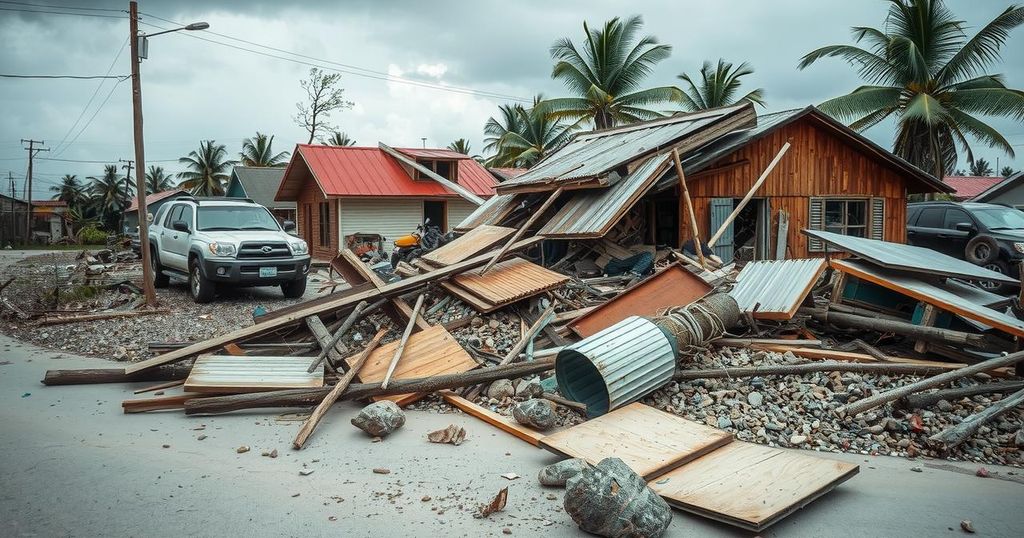Tropical Cyclone Chido Devastates Mozambique, Threatens Vulnerable Communities

Tropical Cyclone Chido has caused severe destruction in Mozambique, especially in Cabo Delgado and Nampula provinces, displacing thousands and hampering relief efforts. UNHCR is providing immediate assistance and is concerned about the vulnerable communities affected by both the cyclone and prior conflicts. Preliminary assessments indicate that 190,000 individuals urgently require humanitarian help, as many homes and schools were destroyed, complicating recovery efforts.
GENEVA – Tropical Cyclone Chido has recently wreaked havoc across northern Mozambique, particularly affecting Cabo Delgado and Nampula provinces with its severe winds and relentless rains. This catastrophic event has destroyed homes, dislocated thousands of individuals, and critically impaired roads and communication networks, which are vital for delivering aid to regions especially burdened with pre-existing high numbers of displaced persons. The UN Refugee Agency (UNHCR) has expressed deep concern for the affected vulnerable populations and is actively collaborating with the Government of Mozambique and other humanitarian partners to facilitate immediate help.
In the aftermath of Cyclone Chido, UNHCR rapidly mobilized its resources. Within just two days of the cyclone’s passage, assistance was provided at a major accommodation center in Pemba, Cabo Delgado’s capital, where over 2,600 individuals received essential items such as blankets, sleeping mats, mosquito nets, and emergency shelter supplies. Furthermore, UNHCR is taking steps to coordinate vital protection services aimed at the most at-risk groups affected by this disaster.
Although initial assessments are still underway and the full extent of the damage in rural areas remains uncertain, reports indicate that approximately 190,000 individuals are in urgent need of humanitarian assistance. The cyclone has wreaked havoc on educational institutions, damaging around 33 schools and destroying nearly 10,000 homes. Many villages have been left with very few dwellings intact. Years of conflict, displacement, and economic challenges have exacerbated the vulnerability of local communities, and for numerous families already displaced, Cyclone Chido represented a devastating setback, erasing the progress they had made in rebuilding their lives.
Prior to the cyclone, UNHCR and its partners strategically pre-arranged emergency supplies and aided the government in disseminating crucial preparedness messages through various media channels, including TV, radio, WhatsApp, and hotlines. This proactive approach enabled local disaster management committees to prioritize support for the most vulnerable groups. In Nampula, while some districts experienced damage, the Maratane refugee camp, which houses over 8,000 refugees, mostly from the Democratic Republic of the Congo and Burundi, reported minimal impact, indicating that recent investments in climate-resilient housing were beneficial.
Moreover, the impact of Cyclone Chido extends beyond Mozambique, affecting the French overseas territory of Mayotte where it has also resulted in fatalities and significant infrastructural damage, particularly risking the safety of vulnerable communities, including asylum-seekers and refugees. UNHCR is vigilantly monitoring the situation in Mayotte and coordinating with local partners. In southern Malawi, destructive winds and rains were reported, causing damage to homes and infrastructure, prompting UNHCR to pre-position shelter kits to aid in government-led recovery efforts.
UNHCR warns that Cyclone Chido might be indicative of a forthcoming intense rainy season, which historical patterns suggest could lead to further cyclones and severe flooding in the region. Displaced communities, already vulnerable, face renewed risks of displacement and loss, underscoring how climate impacts are disproportionately affecting the most susceptible populations. UNHCR remains dedicated to supporting affected communities in Mozambique and neighbouring regions, though resources are rapidly depleting, necessitating urgent assistance for many more individuals affected by the cyclone in the days ahead.
The context surrounding Tropical Cyclone Chido encompasses a region already beleaguered by conflict and economic hardships, leading to high levels of displacement. The cyclone struck northern Mozambique’s provinces of Cabo Delgado and Nampula, resulting in vast destruction and exacerbating the vulnerabilities of individuals and communities displaced by prior conflicts. Moreover, Cyclone Chido has broader implications for climate change, showcasing how extreme weather events disproportionately affect already vulnerable populations. The United Nations Refugee Agency (UNHCR) works to provide assistance and coordinate efforts with local governments and partners to mitigate the impact of such disasters.
In summary, Tropical Cyclone Chido has caused widespread devastation in northern Mozambique, leaving thousands displaced and in dire need of humanitarian assistance. The storm has damaged critical infrastructure and impacted vulnerable populations, who were already struggling due to previous conflicts and economic difficulties. UNHCR is actively engaging in relief efforts but faces resource shortages that heighten the urgency for continued support and intervention as communities endeavor to recover from this disaster.
Original Source: www.unhcr.org







